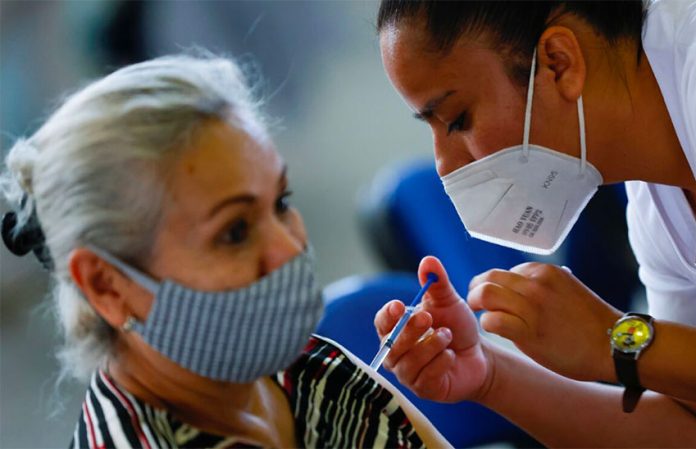The United States plans to send 2.5 million doses of the AstraZeneca Covid-19 vaccine to Mexico, the U.S. government said Thursday, providing a much-needed boost to Mexico’s vaccination program.
White House press secretary Jen Psaki said another 1.5 million doses would be shared with Canada. She added that the arrangement had not been finalized yet, “but that is our aim.”
The announcement comes four days after President López Obrador said he was confident that the U.S. government would agree to supply vaccines to Mexico, where the official Covid-19 death toll is approaching 200,000. He discussed that possibility with U.S. President Joe Biden during a video meeting earlier this month.
Foreign Minister Marcelo Ebrard said on Twitter that he will provide details about the arrangement on Friday morning.
The United States has tens of millions of the AstraZeneca vaccine at local manufacturing sites but is not using any of them because it has not been approved by U.S. regulators. Several European countries have suspended its use because a small number of recipients developed blood clots.
However, the European Medicines Agency declared the vaccine safe on Thursday. AstraZeneca has also said that, based on a review of 17 million recipients, people given the vaccine were less likely than others to develop dangerous clots.
The Mexican government, which has so far only received a single shipment of 870,000 AstraZeneca shots manufactured in India, said last week that it would continue to use the vaccine despite the thrombosis cases. Another shipment from India is expected to arrive soon and the government has an agreement to purchase more than 40 million AstraZeneca shots to be manufactured in Argentina and bottled in Mexico.
The United States’ announcement that it will send vaccines to its neighbors – it’s first foray into Covid-19 vaccine diplomacy – comes at “a critical time in negotiations with Mexico,” The New York Times reported.
It said that sources including Mexican officials revealed that Biden asked López Obrador during their recent video call if more could be done to stop the increasing flow of migrants to the United States-Mexico border.
Mexico has recently ramped up enforcement against Central American migrants traveling through the country to apply for asylum in the United States but U.S. border agents still conducted 100,441 apprehensions or expulsions of migrants at the border in February, a 28% increase compared to January.
Although migration has become a pressing bilateral matter since Biden took office in January, United States and Mexican officials deny that there is any deal on that issue included in the vaccine agreement.
Psaki told a press conference Thursday that bilateral discussions on vaccines and border security were unrelated but overlapping.
Specifically asked whether there were any strings attached to the United States offer to loan vaccines to its neighbors, the White House press secretary said “certainly that’s not the case with Mexico.”
“It’s not the case with any country around the world. And so I wouldn’t read into it more than our ability to provide – to lend – vaccine doses,” Psaki said.
Roberto Velasco, head of the Mexican Foreign Affairs Ministry’s North America department, said in a statement there was no quid pro quo for vaccines.
Migration and vaccines are two separate issues, he said, adding that Mexico is looking for “a more humane migratory system and enhanced cooperation against Covid-19, for the benefit of our two countries and the region.”
Although it is unclear when they might arrive, the AstraZeneca vaccines from the United States will be used to administer second shots to the 870,000 seniors who received a first dose in February, Foreign Minister Ebrard said.
He said the United States’ commitment was “great news” and suggested that additional shipments could be sent, writing on Twitter that it was the beginning of “broad cooperation on vaccines.”
Mexico has administered just over 4.7 million vaccine doses since the country’s vaccination program began on December 24 whereas more than 113 million doses have been given in the United States. Mexico has administered just 3.8 doses per 100 people compared to 34 in the United States, according to the Times vaccinations tracker.
But the vaccination program here is gathering pace after virtually stalling in February due to a lack of supply, and Deputy Health Minister Hugo López-Gatell predicts that up to 600,000 seniors will be inoculated per day starting in April.
The government has received almost 7.2 million vaccine doses to date but said in late February that it expects to receive more than 100 million by the end of May
Mexico has endured one of the worst pandemics in the world, with almost 2.2 million confirmed cases and 195,908 deaths as of Wednesday, according to official data. The real numbers in both categories are widely believed to be much higher, mainly due to Mexico’s low testing rate.
Source: New York Times (en), Milenio (sp)
